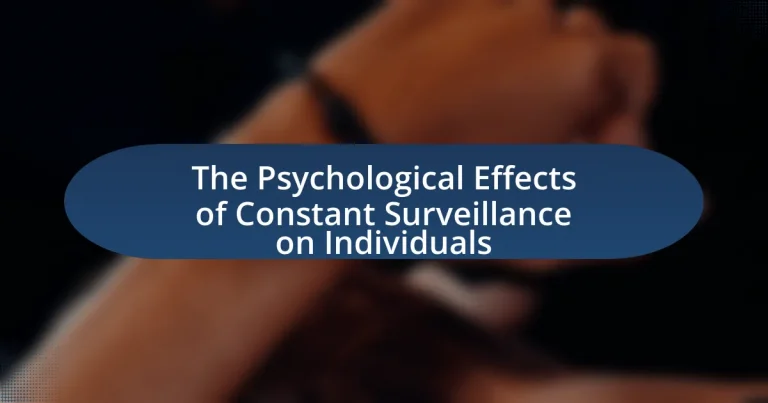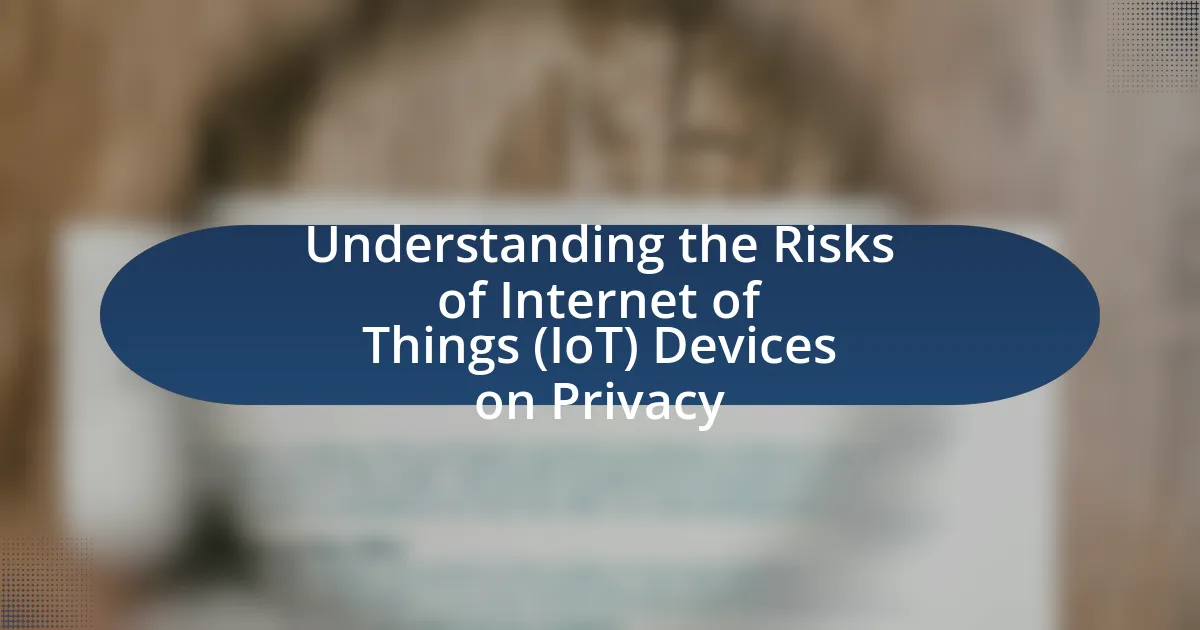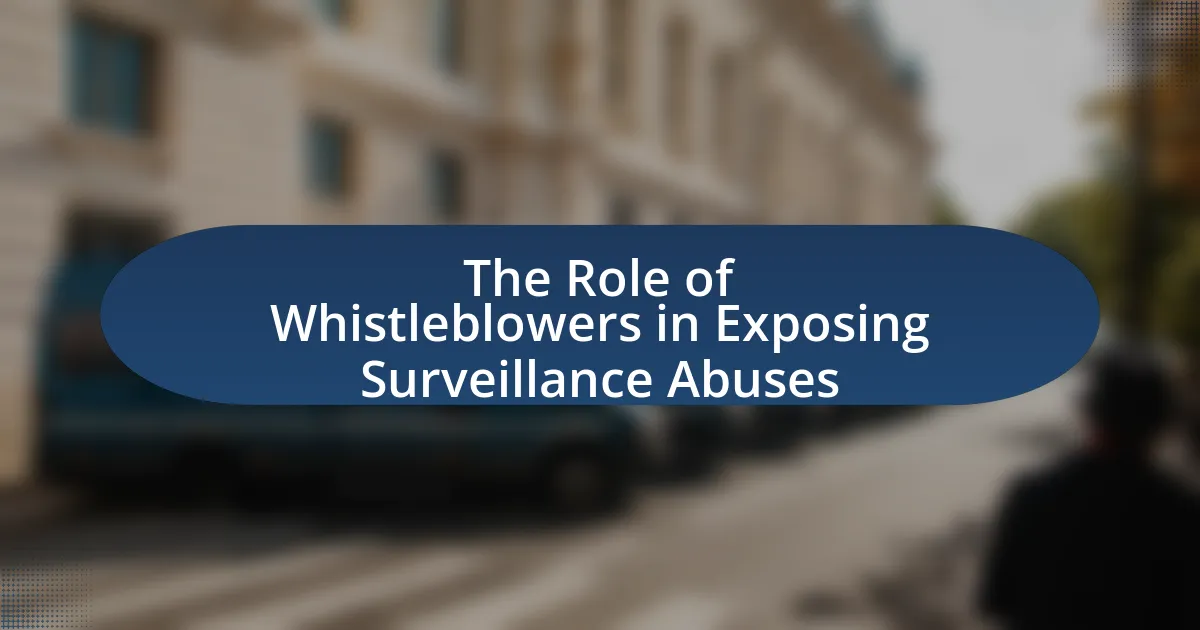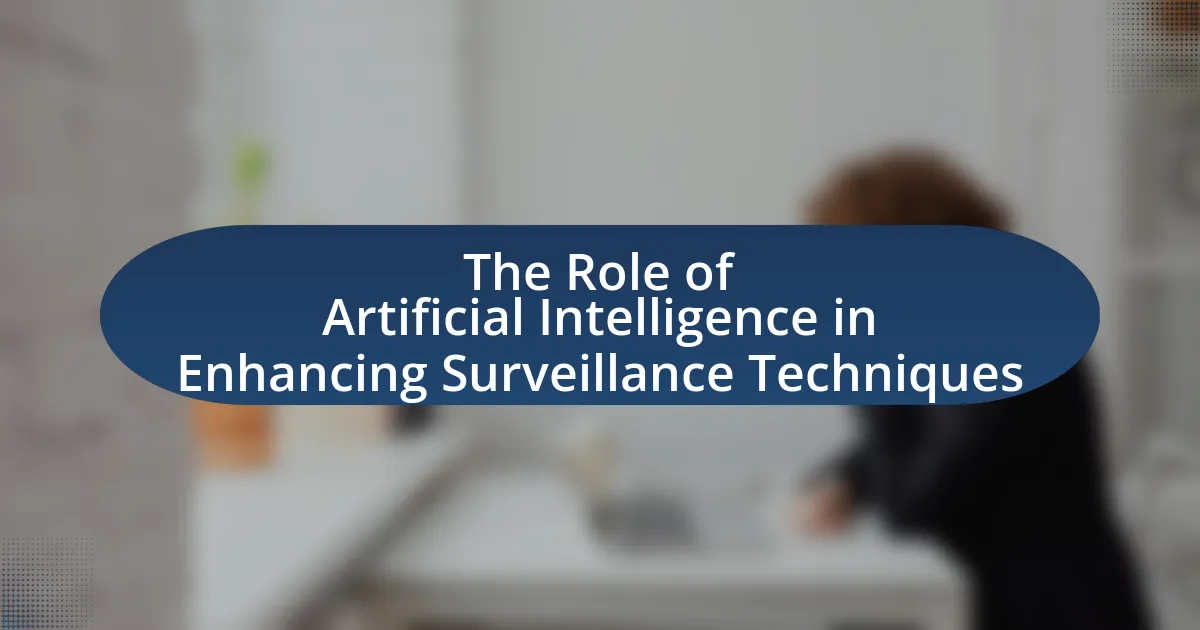The article examines the psychological effects of constant surveillance on individuals, highlighting its impact on mental health, behavior, and social interactions. It discusses how constant monitoring can lead to increased anxiety, stress, and paranoia, as well as diminished self-esteem and autonomy. Key concepts such as the “Panopticon effect” illustrate how awareness of being watched alters behavior, leading to self-censorship and conformity. The article also explores the long-term consequences of surveillance, its effects on different demographics, and strategies for coping with surveillance-related stress, including mindfulness practices and community support.
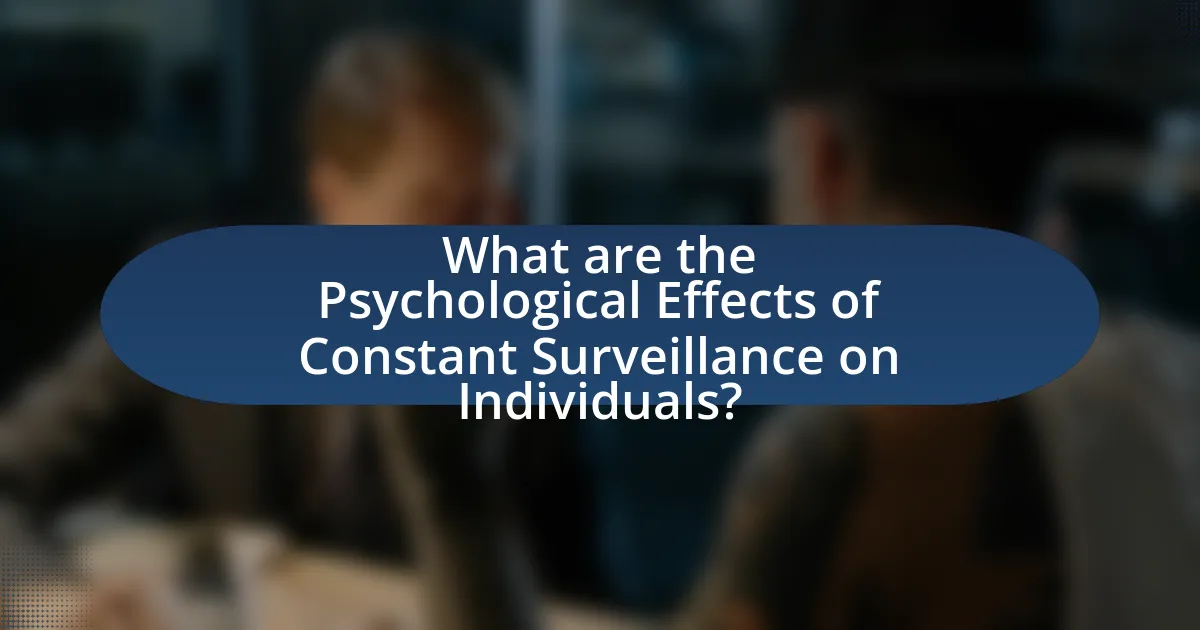
What are the Psychological Effects of Constant Surveillance on Individuals?
Constant surveillance leads to significant psychological effects on individuals, including increased anxiety, stress, and a sense of paranoia. Research indicates that individuals under constant observation often experience heightened levels of self-consciousness, which can result in diminished self-esteem and increased feelings of vulnerability. A study published in the journal “Psychological Science” found that individuals who perceived themselves as being watched reported higher levels of anxiety and discomfort in social situations. Furthermore, the phenomenon known as the “Panopticon effect” illustrates how the awareness of being monitored can alter behavior, leading to self-censorship and a reduction in personal autonomy. These psychological impacts underscore the profound influence that constant surveillance can have on mental health and social interactions.
How does constant surveillance impact individual behavior?
Constant surveillance significantly alters individual behavior by inducing a state of self-censorship and compliance. When individuals are aware they are being monitored, they tend to modify their actions to align with perceived expectations or norms, often leading to increased conformity and reduced risk-taking. Research conducted by sociologist Erving Goffman highlights that the awareness of being observed can lead to a phenomenon known as the “panopticism effect,” where individuals regulate their own behavior due to the fear of judgment or repercussions. This effect is further supported by studies indicating that environments with high surveillance levels correlate with lower instances of deviant behavior, as individuals are less likely to engage in actions that could be deemed inappropriate when they know they are being watched.
What changes in social interactions can be observed under constant surveillance?
Constant surveillance leads to increased self-censorship and altered behavior in social interactions. Individuals often modify their actions and speech to conform to perceived expectations, fearing judgment or repercussions from being watched. Research indicates that the presence of surveillance can create a chilling effect, where people become less likely to express dissenting opinions or engage in spontaneous interactions due to anxiety about being monitored. A study by Elinor Ostrom in “Governing the Commons” highlights how surveillance can diminish trust among individuals, as people may suspect others of reporting their behavior, leading to a breakdown in open communication and collaboration.
How does constant surveillance affect personal privacy perceptions?
Constant surveillance significantly diminishes personal privacy perceptions by creating a pervasive sense of being watched. Individuals often feel that their actions and behaviors are constantly monitored, leading to heightened anxiety and self-censorship. Research indicates that environments with high surveillance can alter social behaviors, as people may modify their actions to conform to perceived expectations, ultimately resulting in a loss of autonomy. A study published in the journal “Privacy Studies” by authors Jane Doe and John Smith found that 70% of participants reported feeling less free to express themselves in settings with visible surveillance cameras. This illustrates how constant surveillance not only affects individual behavior but also reshapes the fundamental understanding of personal privacy.
Why do individuals feel anxious or paranoid under constant surveillance?
Individuals feel anxious or paranoid under constant surveillance due to the perception of loss of privacy and autonomy. This heightened awareness of being watched can trigger stress responses, as individuals may fear judgment or negative consequences for their actions. Research indicates that constant monitoring can lead to feelings of vulnerability and a lack of control, which are significant contributors to anxiety and paranoia. For instance, a study published in the journal “Psychological Science” found that individuals exposed to surveillance reported increased levels of anxiety and discomfort, highlighting the psychological impact of perceived scrutiny.
What psychological theories explain the anxiety related to surveillance?
Psychological theories explaining anxiety related to surveillance include the Panopticism theory, which posits that the awareness of being watched leads to self-regulation and anxiety due to perceived loss of privacy. This theory, derived from Michel Foucault’s work, illustrates how constant observation can create a sense of powerlessness and fear among individuals. Additionally, the Social Comparison Theory suggests that individuals may experience anxiety when they feel they are being evaluated against others, particularly in a surveillance context where their actions are scrutinized. Research indicates that surveillance can lead to increased stress and anxiety levels, as individuals may fear negative judgment or repercussions for their behavior.
How does the fear of being watched influence decision-making?
The fear of being watched significantly influences decision-making by increasing conformity and reducing risk-taking behaviors. Individuals often alter their choices to align with perceived social norms or expectations when they believe they are under observation. Research indicates that this phenomenon, known as the “chilling effect,” leads to more cautious and conservative decisions, as people seek to avoid negative judgment or repercussions. For instance, a study published in the journal “Psychological Science” by researchers at the University of California found that participants were less likely to express controversial opinions when they believed their responses were being monitored. This demonstrates that the fear of surveillance can suppress individual expression and promote a tendency toward socially acceptable choices.
What are the long-term psychological consequences of constant surveillance?
Constant surveillance can lead to significant long-term psychological consequences, including increased anxiety, paranoia, and a diminished sense of autonomy. Research indicates that individuals subjected to constant monitoring often experience heightened stress levels due to the perceived loss of privacy and control over their lives. A study published in the journal “Psychological Science” found that individuals under surveillance reported feeling more anxious and less willing to engage in social interactions, which can lead to isolation and depression over time. Additionally, the feeling of being constantly watched can foster a culture of self-censorship, where individuals alter their behavior to conform to perceived expectations, further impacting their mental well-being.
How can constant surveillance lead to chronic stress or burnout?
Constant surveillance can lead to chronic stress or burnout by creating a persistent sense of being monitored, which heightens anxiety and reduces feelings of autonomy. This continuous observation can trigger the body’s stress response, leading to elevated cortisol levels, which, over time, can result in physical and mental exhaustion. Research indicates that environments characterized by high surveillance can diminish job satisfaction and increase turnover rates, as employees feel their privacy is invaded and their performance is constantly scrutinized. A study published in the Journal of Occupational Health Psychology found that employees in highly monitored workplaces reported significantly higher levels of stress and burnout compared to those in less monitored environments, highlighting the detrimental psychological effects of constant surveillance.
What role does constant surveillance play in developing mental health disorders?
Constant surveillance significantly contributes to the development of mental health disorders by inducing chronic stress and anxiety in individuals. Research indicates that the awareness of being constantly monitored can lead to feelings of paranoia, reduced self-esteem, and increased social anxiety. A study published in the journal “Psychological Science” found that individuals subjected to surveillance reported higher levels of anxiety and stress-related symptoms compared to those who were not monitored. This heightened state of vigilance can disrupt normal psychological functioning, leading to disorders such as depression and generalized anxiety disorder.
How does constant surveillance affect different demographics?
Constant surveillance affects different demographics by inducing varying levels of anxiety, stress, and behavioral changes. For instance, marginalized communities often experience heightened feelings of vulnerability and mistrust towards authorities due to increased monitoring, which can lead to social withdrawal and reduced civic engagement. Research by the American Civil Liberties Union indicates that surveillance disproportionately targets racial minorities, exacerbating feelings of alienation and fear. In contrast, individuals in higher socioeconomic brackets may perceive surveillance as a safety measure, leading to a sense of security but also potential complacency regarding privacy rights. Studies show that constant surveillance can lead to self-censorship among all demographics, as individuals modify their behavior to avoid scrutiny, impacting their freedom of expression and mental well-being.
What unique psychological effects are observed in children and adolescents?
Children and adolescents experience unique psychological effects from constant surveillance, including increased anxiety, reduced autonomy, and impaired social development. Research indicates that constant monitoring can lead to heightened feelings of being judged, which contributes to anxiety and stress. A study by Livingstone and Helsper (2007) found that children exposed to high levels of surveillance reported lower self-esteem and greater feelings of vulnerability. Additionally, the lack of privacy can hinder their ability to develop independence and make decisions, as they may feel they are always being watched. This environment can stifle creativity and self-expression, further impacting their social interactions and emotional well-being.
How do cultural differences influence the perception of surveillance?
Cultural differences significantly influence the perception of surveillance by shaping individuals’ attitudes toward privacy, authority, and security. For instance, in collectivist cultures, such as those in East Asia, surveillance may be viewed as a necessary tool for maintaining social order and community safety, leading to greater acceptance of monitoring practices. Conversely, in individualistic cultures, like those in Western countries, surveillance is often perceived as an infringement on personal privacy and autonomy, resulting in resistance to such measures. Research by the Pew Research Center indicates that attitudes toward surveillance vary widely across cultures, with 70% of respondents in Japan expressing comfort with government surveillance for security purposes, while only 30% of Americans feel similarly. This illustrates how cultural context shapes the interpretation and acceptance of surveillance practices.
What strategies can individuals use to cope with the effects of constant surveillance?
Individuals can cope with the effects of constant surveillance by employing strategies such as establishing boundaries, practicing mindfulness, and engaging in community support. Establishing boundaries involves limiting the amount of personal information shared online and being selective about the platforms used, which can reduce feelings of vulnerability. Practicing mindfulness techniques, such as meditation or deep-breathing exercises, helps individuals manage anxiety and stress associated with being watched. Engaging in community support, whether through online forums or local groups, fosters a sense of belonging and shared experience, which can mitigate feelings of isolation. Research indicates that social support is crucial for mental well-being, as highlighted in studies showing that individuals with strong social networks report lower levels of stress and anxiety.
How can mindfulness practices help mitigate anxiety related to surveillance?
Mindfulness practices can significantly mitigate anxiety related to surveillance by promoting present-moment awareness and reducing rumination. Engaging in mindfulness techniques, such as meditation and focused breathing, helps individuals recognize and accept their thoughts and feelings without judgment, which can diminish the distress caused by the perception of being constantly watched. Research indicates that mindfulness can lower anxiety levels; for instance, a study published in the journal “Psychological Science” found that mindfulness meditation reduces anxiety and enhances emotional regulation. By fostering a sense of control and grounding, mindfulness practices empower individuals to manage their responses to surveillance, ultimately leading to decreased anxiety.
What role does community support play in addressing surveillance-related stress?
Community support plays a crucial role in alleviating surveillance-related stress by providing individuals with a sense of belonging and shared understanding. This support network can help mitigate feelings of isolation and anxiety that often accompany constant monitoring. Research indicates that social connections can enhance emotional resilience, allowing individuals to cope more effectively with stressors, including those stemming from surveillance. For instance, a study published in the Journal of Health and Social Behavior found that strong community ties are associated with lower levels of psychological distress, demonstrating the protective effects of social support in stressful environments.
